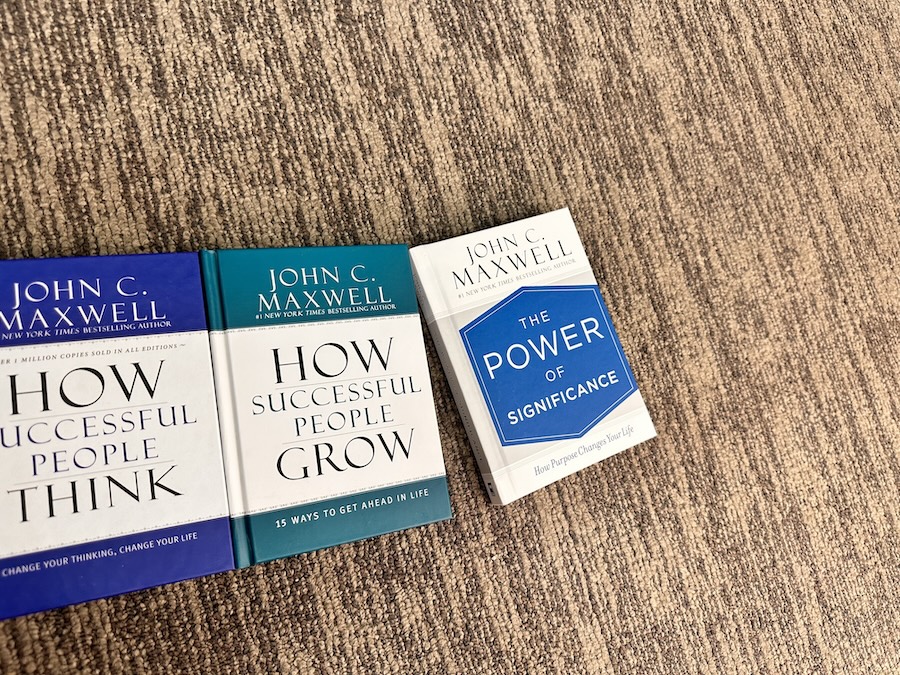How Successful People Think, How Succesful People Grow, The Power of Intelligence

Based on the search results provided, I don't have specific information about a book titled "The Power of Intelligence". However, I can summarize some key points about intelligence from the available information:
1. Intelligence is a powerful attribute that can be developed and enhanced through various means.
2. There are different types of intelligence, including verbal, social, and experiential intelligence.
3. Verbal intelligence involves the ability to use words effectively, understand language nuances, and communicate clearly. It can be improved through activities like reading, writing, and word games.
4. Social intelligence refers to the ability to understand and interact effectively with others. It includes skills like empathy, communication, and reading social cues.
5. Experiential intelligence, as described by Soren Kaplan, is the wisdom and practical abilities gained through life experiences. It can be a valuable asset in leadership and problem-solving.
6. Intelligence is not just about IQ or academic knowledge. It also involves practical skills, emotional understanding, and the ability to apply knowledge in real-world situations.
7. Developing one form of intelligence can positively impact other forms, as they are often interlinked.
8. Intelligence can be enhanced through various practices, including continuous learning, reflection, and challenging oneself with new experiences.
9. The power of intelligence lies in its ability to help individuals navigate complex situations, solve problems, and achieve their goals more effectively.
10. In today's rapidly changing world, adaptability and the ability to learn quickly are becoming increasingly important aspects of intelligence.
While this summary doesn't correspond to a specific book titled "The Power of Intelligence," it captures some general concepts related to the topic based on the available information.
1. Intelligence is a powerful attribute that can be developed and enhanced through various means.
2. There are different types of intelligence, including verbal, social, and experiential intelligence.
3. Verbal intelligence involves the ability to use words effectively, understand language nuances, and communicate clearly. It can be improved through activities like reading, writing, and word games.
4. Social intelligence refers to the ability to understand and interact effectively with others. It includes skills like empathy, communication, and reading social cues.
5. Experiential intelligence, as described by Soren Kaplan, is the wisdom and practical abilities gained through life experiences. It can be a valuable asset in leadership and problem-solving.
6. Intelligence is not just about IQ or academic knowledge. It also involves practical skills, emotional understanding, and the ability to apply knowledge in real-world situations.
7. Developing one form of intelligence can positively impact other forms, as they are often interlinked.
8. Intelligence can be enhanced through various practices, including continuous learning, reflection, and challenging oneself with new experiences.
9. The power of intelligence lies in its ability to help individuals navigate complex situations, solve problems, and achieve their goals more effectively.
10. In today's rapidly changing world, adaptability and the ability to learn quickly are becoming increasingly important aspects of intelligence.
While this summary doesn't correspond to a specific book titled "The Power of Intelligence," it captures some general concepts related to the topic based on the available information.
Based on the search results, here's a summary of the key points from "How Successful People Grow" by John C. Maxwell:
1. The book outlines 15 ways successful people grow and get ahead in life.
2. Key principles include:
- Become an intentional learner - growth doesn't just happen automatically
- Develop self-awareness - you must know yourself to grow yourself
- Believe in yourself and see your own value
- Reflect and allow growth to catch up with you
- Learn to ask more questions and cultivate curiosity
- Find good mentors to learn from
- Focus on enlarging your potential
- Help others reach their potential
3. Maxwell emphasizes changing from incidental growth to intentional growth.
4. He encourages readers to start growing now rather than waiting for the "right time."
5. The book discusses overcoming fears and mistakes that hold people back from growing.
6. It highlights the importance of continuous learning, self-reflection, and adding value to yourself and others.
7. Maxwell provides practical advice like breaking growth into small daily actions and celebrating victories.
8. The overall message is that personal growth is essential for success and it's something anyone can cultivate through intentional effort.
9. The book aims to help readers become lifelong learners who continuously increase their potential.
10. It's described as a compact, inspirational read with actionable advice for personal development.
1. The book outlines 15 ways successful people grow and get ahead in life.
2. Key principles include:
- Become an intentional learner - growth doesn't just happen automatically
- Develop self-awareness - you must know yourself to grow yourself
- Believe in yourself and see your own value
- Reflect and allow growth to catch up with you
- Learn to ask more questions and cultivate curiosity
- Find good mentors to learn from
- Focus on enlarging your potential
- Help others reach their potential
3. Maxwell emphasizes changing from incidental growth to intentional growth.
4. He encourages readers to start growing now rather than waiting for the "right time."
5. The book discusses overcoming fears and mistakes that hold people back from growing.
6. It highlights the importance of continuous learning, self-reflection, and adding value to yourself and others.
7. Maxwell provides practical advice like breaking growth into small daily actions and celebrating victories.
8. The overall message is that personal growth is essential for success and it's something anyone can cultivate through intentional effort.
9. The book aims to help readers become lifelong learners who continuously increase their potential.
10. It's described as a compact, inspirational read with actionable advice for personal development.
Key points from "How Successful People Think" by John C. Maxwell:
Big Picture Thinking: Successful people focus on the larger vision and context rather than getting bogged down in details. They connect past, present and future to see opportunities.
Focused Thinking: They set aside dedicated time to concentrate on priorities without distractions. This allows them to clarify goals and make progress.
Creative Thinking: Successful people actively generate new ideas and solutions. They practice techniques like listing more options when making decisions.
Realistic Thinking: They base decisions on facts and prepare for potential challenges. This allows them to set achievable goals.
Strategic Thinking: They plan ahead and consider long-term consequences of actions. This helps them make better choices aligned with their goals.
Possibility Thinking: Successful people maintain an optimistic outlook and look for opportunities in challenges. They ask "What if?" to explore new ideas.
Reflective Thinking: They regularly take time to review experiences and extract lessons learned. This allows for continuous improvement.
Shared Thinking: Successful people collaborate with others and seek diverse perspectives. This leads to better solutions than thinking alone.
Unselfish Thinking: They consider how their actions impact others and contribute to society. This creates more meaningful success.
Bottom-Line Thinking: They focus on results and outcomes rather than just activities. This keeps them oriented toward their goals.
The book emphasizes that successful thinking is a skill that can be developed through intentional practice. By cultivating these thinking styles, anyone can improve their chances of success.
Big Picture Thinking: Successful people focus on the larger vision and context rather than getting bogged down in details. They connect past, present and future to see opportunities.
Focused Thinking: They set aside dedicated time to concentrate on priorities without distractions. This allows them to clarify goals and make progress.
Creative Thinking: Successful people actively generate new ideas and solutions. They practice techniques like listing more options when making decisions.
Realistic Thinking: They base decisions on facts and prepare for potential challenges. This allows them to set achievable goals.
Strategic Thinking: They plan ahead and consider long-term consequences of actions. This helps them make better choices aligned with their goals.
Possibility Thinking: Successful people maintain an optimistic outlook and look for opportunities in challenges. They ask "What if?" to explore new ideas.
Reflective Thinking: They regularly take time to review experiences and extract lessons learned. This allows for continuous improvement.
Shared Thinking: Successful people collaborate with others and seek diverse perspectives. This leads to better solutions than thinking alone.
Unselfish Thinking: They consider how their actions impact others and contribute to society. This creates more meaningful success.
Bottom-Line Thinking: They focus on results and outcomes rather than just activities. This keeps them oriented toward their goals.
The book emphasizes that successful thinking is a skill that can be developed through intentional practice. By cultivating these thinking styles, anyone can improve their chances of success.

